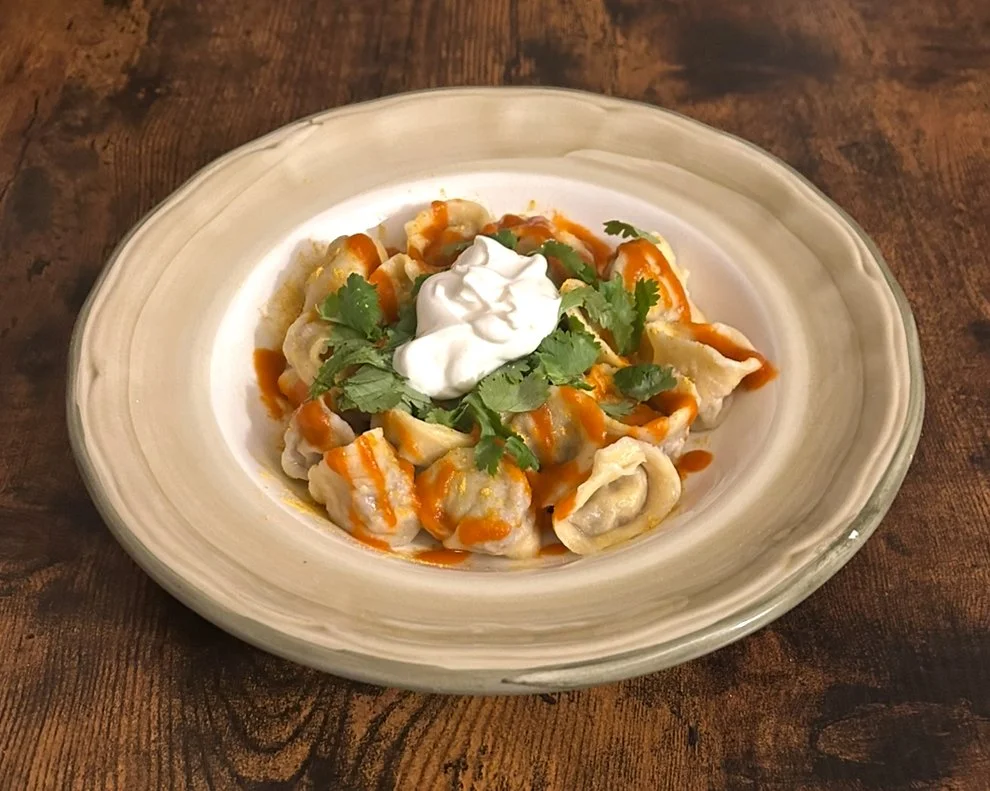Alaskan-Style Pelmeni
Description:
The influence that Russian culture has had in Alaska is an interesting case, as it arrived to the region in two distinct “waves” - the first being in the mid 18th century and the second being in the 20th century. Prior to the arrival of Russian settlers, Alaska was home to a variety of indigenous peoples, who still reside in the region to this day. A small number of Russian settlers set up a colony in Alaska in the mid 1700s, which was comprised of several settlements on the coast of Alaska that were centered around the lucrative fur trade. Many of these settlers intermarried with the native inhabitants, hence why many indigenous peoples in Alaska to this day have Russian surnames and are followers of Orthodox Christianity. The United States purchased Alaska from Russia in 1867, and would go on to become an official American state in 1959. By the mid to late 20th century, the thoroughly-diluted Russian culture in Alaska received a vital rejuvination with the arrival of Russian “Old Believers” to the state. These immigrants belonged to a breakaway sect of Orthodox Christianity who fled persecution in Russia during the time of the Soviet Union. A sizable number of Old Believers relocated to Alaska, where they went on to establish Orthodox Christian communities that exist to this day. Due to the fact that many of the members of this community were born in Russia, or were raised in traditional Russian diaspora communities, these people brought with them a more mainstream Russian culture to Alaska. On account of this cultural revival, a number of Russian dining establishments have been opened in Alaska, serving both traditional and modern variations of popular Russian fare. A uniquely Alaskan preparation of pelmeni, a type of Russian meat dumpling, arose from a popular establishment in Juneau. This preparation involves serving meat or potato filled pelmeni, topped with curry powder, sriracha and cilantro, along with the more traditional accompaniments of butter and sour cream. While making homemade pelmeni may take time, making this dish at home is certainly worth the effort!
Ingredients:
(Makes around 60-80 dumplings)
Fresh chopped cilantro
Curry powder
Sriracha hot sauce
Sour cream
Melted butter
Filling
1/2 lb. ground beef
1/2 lb. ground pork
1 tsp vegetable oil
1/4 cup onion, finely chopped
1 clove garlic, minced
Salt & pepper
Dough
2 eggs
1 cup flour
Preparation:
Heat a pan over medium heat and add the oil, garlic and onion. Cook until softened, about 5 minutes. Add the cooked onion to a bowl, along with the ground pork and beef. Mix thoroughly and season to taste with salt & pepper (roughly 1 tsp each) - you can test the seasoning by cooking a small amount of the filling and tasting it.
To make the dough, mix together the flour and eggs in a bowl, then turn on to a board and knead until smooth, about 5-10 minutes. Rest for 30 minutes.
Cut the dough into quarters or thirds and one at a time, roll them out on a floured board. The dough is thin enough when you can see your hand through the other side. Use a shot glass to cut circles of dough out - you will have leftover dough, but feel free to dampen it slightly and roll back into a ball to use later.
To fold the dumplings, place a small spoonful of the filling in the center of each dough circle. Fold the circle in half around the filling to create a half moon ravioli shape, and pinch the ends together to seal. You can leave them this way if you like, but for a more classic pelmeni, fold the two ends of the half moon together around your finger, then pinch them together to seal into a tortellini shape.
To cook, boil the pelmeni for 1-2 minutes in salted water. Drain, then toss with melted butter. Top with a sprinkle of curry powder, sriracha to taste, cilantro and a spoonful of sour cream.
Notes:
If you have a pasta machine feel free to use that instead of hand rolling the dough.
Pelmeni freeze well - simply boil them for 4-5 minutes if using straight from the freezer.

